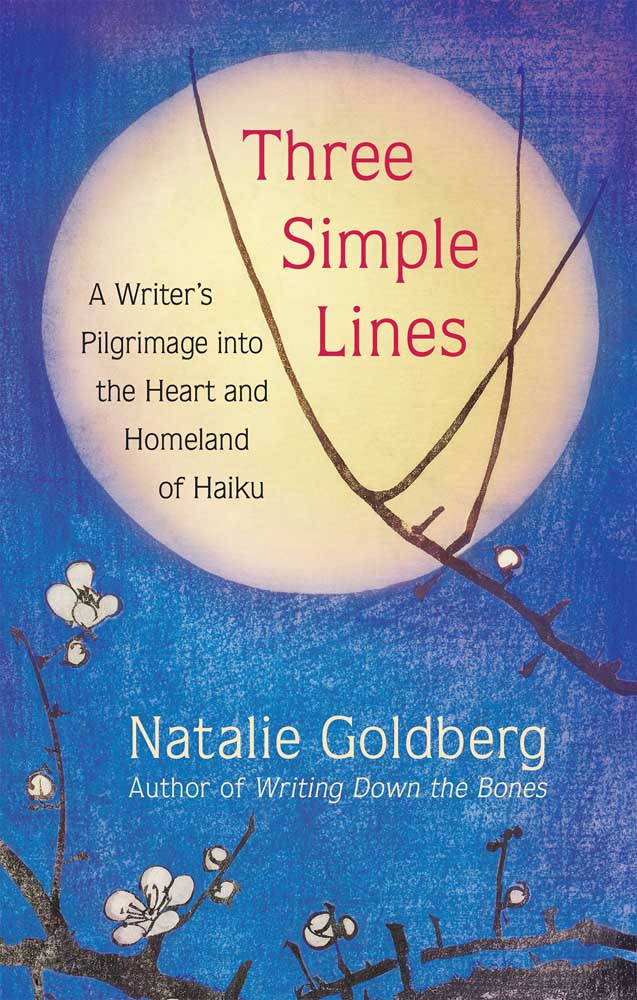Author Natalie Goldberg hunts for haiku’s home
Published 2:20 pm Wednesday, January 27, 2021

- Three Simple Lines
For her 15th book, the fittingly titled “Three Simple Lines,” famed author and writing instructor Natalie Goldberg went in search of the roots of haiku. As its subtitle — “A Writer’s Pilgrimage into the Heart and Homeland of Haiku” — states, she traveled to Japan, the poetry form’s country of origin, to visit birthplaces, graves and other sites related to four lauded Japanese poets: Matsuo Basho, Yosa Buson, Kobayashi Issa and Masaoka Shiki.
In richly descriptive prose often reminiscent of haiku, Goldberg reports on and ruminates over places such as Osaka, where Buson was born and Basho died, and finds seamless ways to weave in her own poetry path. Osaka, also the hometown of the Zen teacher who suggested she become a writer 30 years earlier. Along the way, Goldberg makes other discoveries, including learning of Fukuda Chiyo-ni, an 18th century woman who wrote haiku.
Goldberg will read from “Three Simple Lines” in a virtual event on Tuesday . Local writer Sarah Cyr, a student of Goldberg’s, will co-host the event along with Roundabout Books in Bend.
Basho, Buson, Issa and Shiki, whose lives and writings date as far back as the 17th-19th centuries, came on Goldberg’s radar back in 1976 when she studied with the poet Allen Ginsberg for six weeks at the Naropa Institute in Boulder, Colorado. In fact, that was the first and last formal writing class taken by Goldberg, best known for her writing guide “Writing down the Bones.”
“My Zen teacher was my great writing teacher,” she said. “We never talked about writing, but through working with him, I learned writing. … He was the one that said, ‘Why don’t you make writing your practice?’ I think he could tell how deeply I loved writing. That it was genuine. I wasn’t looking for applause. It was coming from a deep place.”
Goldberg said that it was important to her to visit Japan and see the places where they lived and worked because “When I love a writer or a painter, I often go to their grave, if they’re dead. I go to their grave, and it feels like I’m honoring them. I’m just thanking them for their work.
“Obviously, they’re dead, but it’s not that strange. Don’t people go to their parents’ graves, their grandmothers or their aunts? It’s also interesting to me where they ended up. Where did these people end up? Of course they’re going to end up dead, but where? Especially with the haiku writers. They always write a haiku before they die to show their minds before they die.”
With National Poetry Month coming in April, and National Haiku Poetry Day on April 17, it never hurts to get a refresher in poetry’s various forms, and Goldberg offered this refresher for those who may not recall haiku very well: “Haiku is three short lines, and in Japan, it’s five syllables-seven syllables-five syllables. But in Japanese, they don’t have like in English, ‘the,’ ‘that,’ ‘of,’ so that every syllable really counts for something,” she said.
“If you’re writing in English, three short lines, it doesn’t have to be five-seven-five. As Allen Ginsberg told me in 1976 … ‘The true test of a haiku, when you hear one, you feel a slight sensation of space in your mind.’ And that sensation of space, he said, ‘is nothing less than God.’” After a beat, she added, “Yeah, that’s wonderful.”
Goldberg is also a painter, but even for painting, “I follow the rules of writing practice,” she said. “And really underneath it all is Zen for me, Zen practice.”
In these creative pursuits, she’s not one to await a tap on the shoulder from her muse.
“The main thing that instills any confidence in my writing life is that I show up,” she said. “I say I’m going to write, and I do.”
However, she will change up her writing schedule just to keep it lively.
“Writing is practice for me, but it changes. You know, I’ve been writing for over 45, 50 years, so over the years, it changes. It matters what book I’m working on. … Every book asks something different of me.”
And she in turn is asking something of readers of “Three Simple Lines”: “I would like them to fall in love with haiku, and have a real pleasure in that,” she said. “Also, culturally, to have a little bit of an opening into Japanese culture.”
What: Virtual reading of “Three Simple Lines,” by Natalie Goldberg
When: 6 p.m. Tuesday
Cost: Free
Contact: sarahcyr.com/workshops






